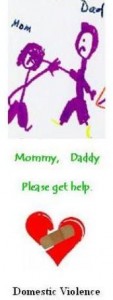Kids are impacted by spousal domestic violence (DV) in their home. Monumentally so. Yet most parents say they’ve hidden the violence from the children. Many often believe it. But studies and experience show the opposite. Children often hear abuse late at night. They sense the tension. Notice bruises. Even infants are deeply affected. And some abusers purposely assault and/or demean a woman in front of the children.
Many problematic behaviors in children (crying jags, clinginess, tantrums, sleep problems) are triggered by things beyond DV. But a few related to DV you might not think of are:
Children believing they caused the abuse
Thinking they cannot escape being violent, it’s in their blood
Refusing to go to school/faking illness
Drug/alcohol use/abuse
Running away
Suicide attempts
Children often put themselves in danger by stepping into the violence attempting to stop it. Youngsters in DV households are at much greater risk of being abused themselves. Even pet in these homes have a shortened life span.
My space here isn’t sufficient for all the explanations of how and why. And the impact of spousal abuse on a child will vary depending upon his developmental stage. But all kids try to make sense of their surroundings. If you think about it—how they do that is amazing. We adults would have great challenges and make myriad errors if we were dumped into a foreign land, knew nothing of their language and customs, and had to intuit everything. We’d make many wrong assumptions. And kids do. (See the DOVE page for an excellent story of just such a funny error one adult made.)
Sadly, often the parents are so embroiled in the DV cycle that they don’t see the impact on the children. Is this not good reason for all of us to:
be informed?
learn to safely address our concerns with the adults?
identify resources for families impacted?
Support local shelters/service providers who assist victims & children?
Links to information and resources are in the Oct. 15 post “October Surprise.” A few of the many helpful books (with links to see them at Amazon) are:
DOMESTIC VIOLENCE: What Every Pastor Needs to Know, Al Miles
Contains helpful information on domestic violence: identifying, responding, safety. It’s a good read for anyone, not just clergy.
WINNING YOUR WIFE BACK BEFORE IT’S TOO LATE, Dr. Gary Smalley
While this sounds like a “how-to” manual for men, it excels at showing what a healthy relationship should look like—a fact many in DV families no longer remember.
THE VERBALLY ABUSIVE RELATIONSHIP, Patricia Evans
Many think DV is only about physical abuse. It isn’t. And victims often describe the verbal abuse as more deeply wounding. ALL types take their toll, but do not minimize verbal abuse.

